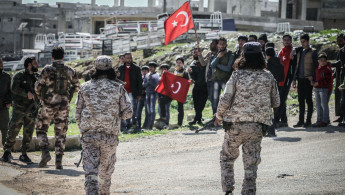Idlib at risk of new Syrian regime military action
The latest Idlib strikes on Wednesday killed at least eight children and two women, according to the White Helmets, while medical centres have also been hit in a wave of bombings, according to the civil rescue team.
A Russian-Turkish ceasefire is officially in place in Idlib despite shells being directed on towns and villages in the demilitarised zone on a daily basis since February.
Russia is reportedly growing frustrated with Turkey's inaction, with rebel heavy weaponry reportedly not pulled out of the demilitarised zone, while Idlib remains dominated by hardline faction Hayat Tahrir al-Sham (HTS). The divisions could pave the way for new military action in the opposition province, some analysts predict.
Clashes between regime and HTS fighters and their allies have escalated in Hama and Latakia over the recent weeks, while shelling of the demilitarised zone has caused an exodus and a new humanitarian crisis.
"The Syrian regime has recently intensified its air and artillery campaign in Idlib with reportedly catastrophic consequences for civilians living there," Airwars reported.
"Some residential areas were said to have been levelled to the ground in [the Idlib countryside]... Russia's own involvement at Idlib still appeared limited."
Residents fear the Syrian regime could be planning an offensive on these territories with Russia air support.
Read also: Syria's Idlib under attack, forcing humanitarian work to halt
Turkey's Defence Minister Hulusi Akar said on Thursday that his government was working with Russia to save the ceasefire agreement, which appears close to collapse.
"We are working on a joint coordination centre," Akar said.
Turkish patrols in the demilitarised zone began suddenly last Friday, with the Russian military expected to do the same on the eastern side of Idlib.
The fact that the Russian air strikes hit the demilitarised zone just hours after the Turkish patrols commenced will be embarrassing for Ankara. Some analysts believe that Moscow - which supports the Assad regime - is ratcheting up pressure on Turkey - which backs the opposition.
|
|
"Right after the Russian strikes Turkey announced the establishment of a coordination centre. I think this means that Russia has achieved what it wanted to - deeper military coordination," Yury Barmin, a fellow at the Russian International Affairs Council, told The New Arab.
He said that Turkey is keen to prevent military operations extending inside Idlib, while Russia is seeking some concessions from Ankara.
"What Russia might be trying to achieve here is to have the Syrian government take over some areas, but not launch a full-scale operation. Maybe some targeted actions could be possible, especially given that Turkey recently said the no-fly zone over Idlib doesn't apply to it," he added.
"It is a strategy - applying military pressure and then get the gears going and all of a sudden everybody starts making efforts."
The heaviest strikes have also coincided with an EU conference on Syria, where differences remain between member states on how to deal with Bashar al-Assad's regime.
"Maybe that was part of the calculations - show the Europeans we are serious about this."
Syrian journalist Zouhir al-Shimale believes that despite talks between the two sides, relations between Turkey and Russia have reached another low ebb not seen since a diplomatic war broke out between the two sides when Ankara shot down a Russian plane in 2015.
"Both sides look like competitors rather than companions. Turkey is flooding their troops into Idlib, while Russia is bombing and putting more pressure upon the Turks to deal with HTS. These attacks count as a threat as Turkish soldiers are within the bombarded areas," he told The New Arab.
"Given the latest Russian escalation the Assad regime will undertake ground operations - with Russia's help - to take parts of Idlib, which are supposed to be part of the demilitarised zone. Russia will take the Turkish inability to remove HTS from Idlib as an excuse to launch their attacks."



